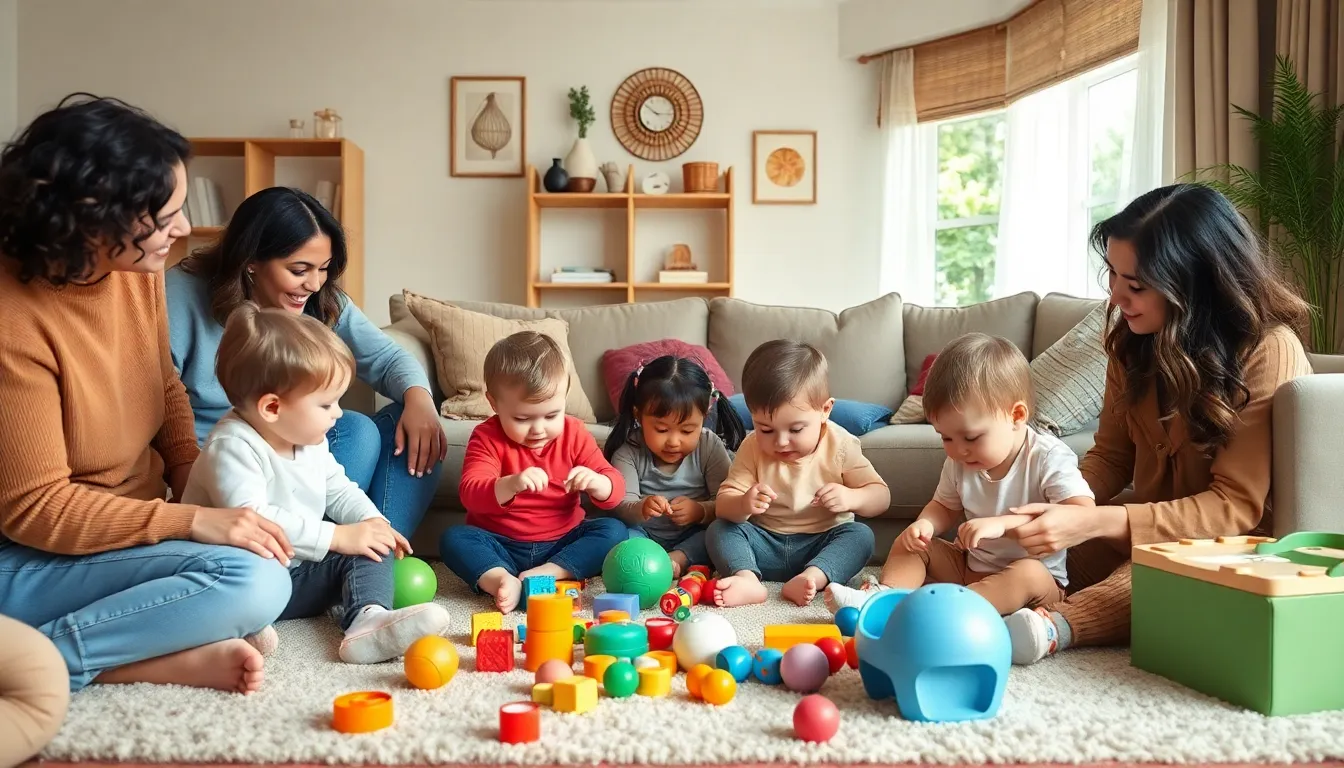Table of Contents
ToggleRIE parenting, short for Resources for Infant Educarers, isn’t just a fancy term—it’s a revolutionary approach that’s turning the parenting world upside down. Imagine a style where kids are treated as capable individuals from the get-go, rather than tiny humans who need constant supervision. Sounds liberating, right? This method champions respect, trust, and the idea that kids can learn through their own experiences.
What Is RIE Parenting?
RIE parenting, or Resources for Infant Educarers, centers on the idea of treating infants and toddlers as capable individuals. This approach encourages parents to respect their child’s needs and instincts. By giving children the autonomy to explore their environment, caregivers foster independence and confidence.
Parents practicing RIE engage in mindful observation, allowing them to understand their child’s unique cues and behaviors. They facilitate self-directed play, which helps children learn through firsthand experiences. Children thrive when caregivers provide a safe space, reducing interference in their natural exploration.
The philosophy emphasizes trust between the caregiver and child. When caregivers trust that children can navigate their own challenges, it promotes a sense of competence. Children develop decision-making skills essential for lifelong learning.
Routine plays a key role in RIE parenting. Consistent daily schedules help children feel secure, knowing what to expect. In turn, this predictability supports self-regulation and emotional stability.
Praise and criticism are minimized in this approach. Instead, caregivers offer acknowledgment of a child’s efforts, reinforcing intrinsic motivation. These interactions cultivate a deeper understanding of emotions and social dynamics.
RIE invites parents to engage in respectful, authentic communication. Listening attentively and responding to children’s needs form the basis of a strong relational foundation. Through this dialogic process, children learn to express themselves, and caregivers develop empathy and connection.
Adopting RIE parenting principles transforms the parent-child relationship. It guides families in nurturing resilient, confident children equipped for life’s challenges. This method reshapes traditional parenting norms, encouraging a shift towards collaboration rather than control.
The Principles of RIE Parenting

RIE parenting principles focus on fostering autonomy and building trust between caregiver and child. This method emphasizes respect for the child’s instincts and capabilities and encourages an authentic relationship.
Respect for the Child
Respecting the child forms the foundation of RIE parenting. Parents acknowledge that children are capable individuals, deserving of dignity and consideration. Encouraging exploration fosters independence and confidence. Allowing children space to make choices supports their innate curiosity. This approach nurtures a sense of competence, essential for lifelong learning.
Communication and Observation
Effective communication and keen observation play vital roles in RIE parenting. Mindful observation helps parents understand unique cues from their children. Recognizing body language, facial expressions, and vocalizations deepens the connection. Authentic communication fosters emotional intelligence and empathy. Sharing feelings and experiences nurtures stronger relationships, enhancing trust and cooperation in the parent-child dynamic.
Benefits of RIE Parenting
RIE parenting offers numerous advantages that benefit both children and caregivers. This approach fosters a deep connection with children while promoting their independence.
Enhanced Independence
Children flourish under RIE parenting as they engage in self-directed play. Exploration becomes a natural part of their learning process. Autonomy helps them develop decision-making skills, which are crucial for their future. Parents encourage this independence by allowing children to choose activities freely. RIE parenting shifts the focus towards trusting children’s instincts, empowering them to take initiative. Research indicates that children who have opportunities for self-discovery build confidence more effectively. This independence in infancy often leads to more resilient individuals in adolescence and adulthood.
Strong Parent-Child Bond
RIE parenting strengthens the bond between parent and child through respectful communication. When caregivers engage in mindful observation, they become attuned to their child’s needs. Understanding these cues fosters trust, making children feel safe and valued. Parents focus on authentic interactions, allowing for emotional expression without judgment. This responsive approach deepens connections and nurtures emotional intelligence. Studies demonstrate that strong parent-child bonds contribute to enhanced emotional well-being in later years. Overall, RIE parenting cultivates a supportive environment where relationships thrive, reinforcing the importance of mutual respect and understanding.
Implementing RIE Parenting in Daily Life
RIE parenting integrates daily practices to foster respect and autonomy in children. By focusing on the environment and play, caregivers create a nurturing atmosphere.
Creating a Safe Environment
Creating a safe space encourages infants and toddlers to explore freely. Parents can use soft materials, secure furniture, and age-appropriate toys to prevent injuries. Safety measures include removing hazards from reach, ensuring a clean play area, and observing children without obstruction. Awareness of children’s movements enables caregivers to respond appropriately and maintain safety. Consistent monitoring allows parents to trust their child’s exploration while feeling secure in their environment. Familiarity with surroundings boosts confidence and encourages independent play.
Encouraging Exploration and Play
Encouraging exploration fuels learning and development. Children thrive when given the freedom to engage in self-directed activities. Parents can initiate this by providing open-ended toys, such as blocks or art supplies. Allowing children to choose their play fosters a sense of ownership and motivation. Participation in play invites caregivers to join in without dominating. Engaging in conversations about activities enhances understanding and emotional awareness. Caregivers can step back and observe, enabling children to navigate their own discoveries. This balance cultivates a deep-rooted trust between parent and child, reinforcing the principles of RIE parenting.
Common Misconceptions About RIE Parenting
Many mistakenly believe that RIE parenting means neglecting children by giving them too much freedom. In reality, this approach focuses on empowering children through autonomy while ensuring a safe and supportive environment. Others think that minimizing praise and criticism signifies a lack of encouragement. Instead, RIE emphasizes recognizing efforts to foster intrinsic motivation.
Some people assume RIE parenting requires an unrealistic level of observation and attention. Mindful observation is vital, but it doesn’t demand continuous oversight. Caregivers can engage in this practice while maintaining a healthy balance with their daily responsibilities. Additionally, there’s a common notion that RIE neglects structure and routine. Establishing consistent daily schedules is essential, as they provide security and help children develop self-regulation.
Another misconception involves the belief that RIE parents avoid interaction with their children. Cues are carefully noted, and caregivers participate in children’s play without overshadowing them. Interaction remains respectful and attuned to the child’s pace. It’s also thought that RIE parenting lacks discipline. In reality, it fosters essential decision-making skills and emotional intelligence, enabling children to understand their emotions better.
Some believe that children raised with RIE methods cannot adapt to other parenting styles later. In fact, children typically develop resilience and flexibility, qualities that benefit them in diverse environments. Lastly, many perceive RIE as only suitable for specific situations or ages. This philosophy supports all age groups, encouraging continued growth and development as children mature.
RIE parenting offers a refreshing perspective on nurturing young children. By emphasizing respect and autonomy it empowers kids to explore their environment while fostering essential life skills. This approach nurtures independence and builds a strong parent-child bond grounded in trust and understanding.
Parents who adopt RIE principles create a supportive atmosphere where children can thrive. Through mindful observation and authentic communication caregivers can better recognize their child’s needs. This leads to enhanced emotional intelligence and resilience that benefits children throughout their lives.
Ultimately RIE parenting transforms the traditional dynamics of child-rearing into a collaborative partnership. By embracing this philosophy parents can cultivate an environment that not only respects children’s capabilities but also enriches the overall family experience.







